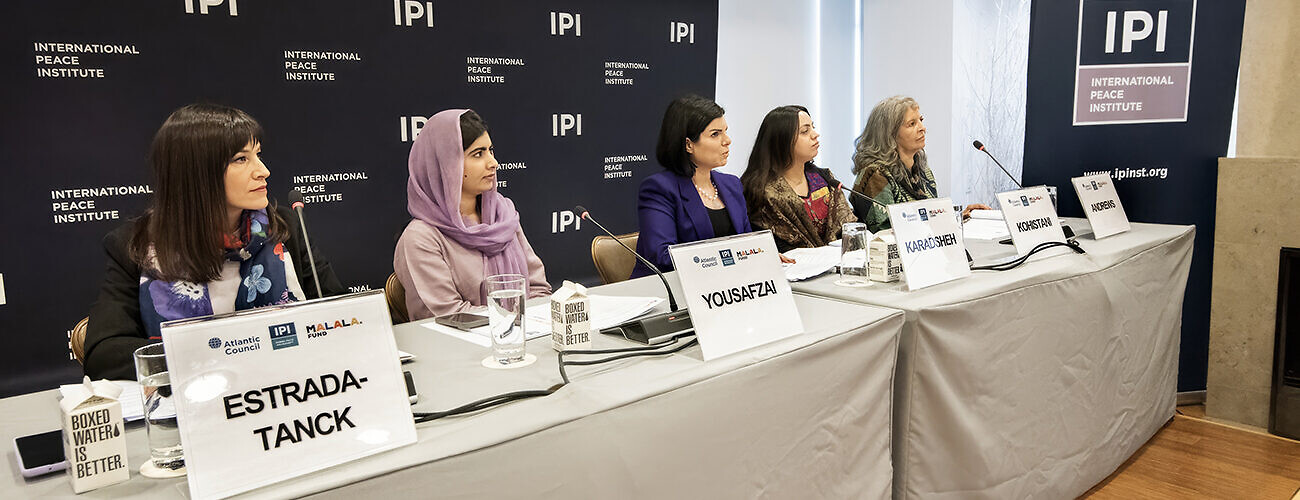In collaboration with the Malala Fund and the Atlantic Council, IPI hosted a high-level panel discussion to mark International Women’s Day on March 8th. The event addressed the harrowing reality of millions of women and girls living under systematic oppression at the hands of the Taliban and highlighted the ongoing efforts of Afghan women and the international, legal, and research communities to ensure justice for these abuses—in particular, the momentum around efforts to codify the crime of gender apartheid.
The discussion placed thought-leaders of international law, human rights experts, Afghan women, diplomats, and activists in dialogue to offer insights on the lack of basic rights and fundamental freedoms for women and girls in Afghanistan since the Taliban’s repressive regime took over in August 2021. Panelists shed light on the crimes being perpetrated by the Taliban, called on the international community to recognize these crimes, and discussed developing tools for accountability. The event also offered a platform for the testimony of women and girls impacted by the Taliban alongside that of legal and policy experts on gender apartheid.
Participants heard directly from Afghan women and girls in the audio recordings of the initiative “Inside Afghanistan’s Gender Apartheid,” an interactive audio timeline and collaborative effort between the Atlantic Council’s South Asia Center and the Civic Engagement Project. The initiative, which was publicly launched at the event, documents the first-hand accounts of life under gender apartheid and analyzes the impact of the Taliban’s increasingly entrenched and institutionalized legal system that curtails freedom, stifles potential, and erodes dignity.
Deputy Permanent Representative of Mexico Alicia Buenrostro Massieu delivered opening remarks, situating the deteriorating state of Afghan women and girls within the larger international imperative to achieve and protect gender equality for all. Articulating the global backlash on women’s rights she instructed, “the pushback is intensifying and so must our response…it is high time to end the systematic exclusion of women and girls.”
Nayera Kohistani, women’s rights defender and teacher, spoke from her personal experience of “dehumanization” and being reduced to a “second-class citizen…with no human agency or dignity.” While she painted a vivid and grim picture of the situation that Afghan women face on the ground where “the Taliban has criminalized [their] whole existence and identity,” she also shared details of Afghan resistance and protest.
Nobel Peace Laureate Malala Yousafzai labeled the event a true moment of solidarity. She drew attention to the technologies of “highly calculated policies of oppression” that the Taliban relies on, noting that Afghanistan is the only country in the world that forbids girls from completing an education. She emphasized the need for solidarity from the global community with the girls who are “having their childhood and their future stolen” to not only change the conditions for Afghan girls but to also communicate to all girls around the world that their education, humanity, and human rights matter.
Panelists Penelope Andrews, anti-apartheid expert and Professor of Law and Director of the Racial Justice Project at New York Law School, and Dorothy Estrada-Tanck, Chair of the UN Working Group on Discrimination against Women and Girls, provided the legal and policy expertise on the codification of gender apartheid in international law. Drawing from a depth of knowledge on racial apartheid in South Africa, Professor Andrews identified the situation of women in Afghanistan as unequivocal gender apartheid based on the evidence of systemic, vicious, and comprehensive oppression and denial of basic civil and political rights on every level. She made an actionable request: include gender apartheid in the draft convention on crimes against humanity. To galvanize and focus efforts, she said, naming a harm is one of the most influential tools available so there is an imperative to recognize what is happening to Afghan women clearly: “This is gender apartheid – calling this what it is, we can create the conditions for people to be able to live dignified lives.”
Dorothy Estrada-Tanck identified the explicit codification of gender apartheid in Afghanistan as a priority for the UN Working Group on Discrimination against Women and Girls. While there are legal instruments currently available to address the rights violations women in Afghanistan are facing based on human rights tools built over the last 80 years, Estrada-Tanck pinpointed their insufficiency to identify and frame the mass nature and scale of this “state-sponsored, institutionalized and systematic oppression and subjugation.” Recognizing and codifying this as a crime against humanity is necessary to accurately name and understand the full scope of the elements of this regime and most importantly, to trigger action from the international community. Calling on the international community’s not just moral, but legal obligation to prevent and combat this crisis, she concluded, “This is a test for the multilateral system, where are we going to draw the red line?”
The event was co-sponsored by the Global Justice Center, Rawadari, the Georgetown Institute for Women, Peace and Security, and the Permanent Missions of Mexico and Malta.
Opening/Closing Remarks:
Zeid Ra’ad Al Hussein, President and Chief Executive Officer, International Peace Institute
H.E. Vanessa Frazier, Permanent Representative of the Republic of Malta to the UN
H.E. Alicia Buenrostro Massieu, Deputy Permanent Representative of Mexico to the UN
Speakers:
Malala Yousafzai, Nobel Peace Laureate
Nayera Kohistani, Afghan Activist and Expert
Penelope Andrews, John Marshall Harlan II Professor of Law & Director, Racial Justice Project, New York Law School
Dorothy Estrada-Tanck, Chair, UN Working Group on Discrimination against Women and Girls
Moderator:
Jomana Karadsheh, International Correspondent, CNN








